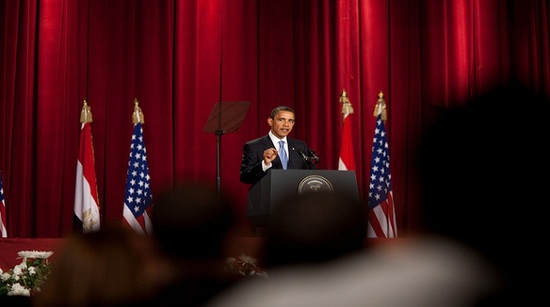Imagine the following scenario: On the night of November 6, 2012, voting irregularities in the U.S. Presidential elections surface in several states, including Colorado, Florida and North Carolina. In the latter, hundreds of voters tell the press they have been turned away from the voting booth. In Colorado, technical difficulties have turned thousands of votes invalid, and in Florida results in thirteen districts are suspiciously similar. Just like 12 years ago, the Supreme Court takes on the matter. In a 5-4 decision, the court rules that Mitt Romney, despite having lost the popular vote, has won the overall election and will become the 45th President of the United States.
Such a situation would surely lead to a profound process of soul-searching in the United States and possibly bring upon a reform of the electoral process. But would it reduce the United States’ strategy of promoting democracy around the world? Probably not. Even before the Civil Rights Movement in the 1950s, the United States fought wars and intervened in the Caribbean in the name of democracy. A dramatic rise in funding for pro-democracy promotion abroad occurred against the backdrop of domestic problems regarding low voter turnout and decreasing confidence in the 1990s. This suggested that there is no direct connection between the quality of a country’s democracy and its interest in promoting the idea abroad.
This insight runs counterintuitive to how most supporters of democracy promotion justify the practice. Looking at their rhetoric, it is precisely the high quality of democracy and its people’s experience with it that allows or even obliges them to go abroad and spread democratic ideas . Even Brazil’s President Dilma Rousseff indirectly affirmed the logic when, asked about her silence on human rights abuses in Cuba, she pointed out that Brazil needed to first solve problems at home before giving advice to others.
The scenario described above, of course, is somewhat simplistic: Clean elections are a key element of democracy, but other factors matter as well, such as a free press, freedom of speech, a vibrant civil society – all of which are present in the United States.
But if the quality of democracy is not necessarily a determining factor of democracy promotion, why do some countries promote it and others not? Liberals say that as democracies never wage war against other democracies, democracy promotion is the best way to assure global peace. Others argue that countries use democracy promotion to obtain economic and strategic advantages – the United States has avidly promoted democracy to convince countries to join to the global market. Aside from being more likely to open up to trade, democracies tend to be more predictable, less likely to be home of famines, and more likely to engage in multilateral organizations.
Finally, capacity matters. The United States and Europe, who together spend about 2 billion US-dollars per year on democracy promotion, do so because they have the means of doing so – in both financial and human resource terms. Even if rising democracies such as India and Brazil wanted to emulate the United States and Europe as multi-level democracy promoters, they would not have the people available in order to implement such a strategy. Neither Brazil nor India possess a National Endowment for Democracy (NED) or a Carnegie Endowment for International Peace that trains people on how to promote or assist democracy elsewhere.
The question whether strategic and economic interests align with democracy promotion may help explain Brazil’s and India’s behavior regarding the issue. India is competing with China for influence in countries such as Sri Lanka, Bangladesh and Myanmar, so policy makers in Delhi fear that criticizing neighbors could drive them into Beijing’s arms.
For Brazil, on the other hand, defending democracy in the region is much more aligned with its interests as a rising power. Avoiding political crises in Paraguay, Ecuador and Bolivia is crucial in order to protect Brazilian investments in the region. Stable democratic neighbors are also better at combating arms- and human trafficking along Brazil’s borders. Democratic leaders are better at avoiding and dealing with humanitarian crises, thus avoiding potential refugee flows into Brazil. Democracies are better at protecting human rights domestically, improving South America’s traditionally tainted image in the world. Finally, defending democracy in the region is a comparatively cheap enterprise – rather than sending thousands of expensive Brazilian democracy-promoting specialists into the field, Brazil merely intervenes whenever things go wrong – as seen recently in Paraguay. Brazil’s swift and unequivocal reaction to the political rupture in Asunción sets a clear precedent in the region. In the future, elites in Quito, Caracas and the other capitals in the region will think twice before instigating a political crisis.
Read also:
What future for democracy promotion in a Post-Western World?
Book review: “Aiding Democracy Abroad: The Learning Curve” by Thomas Carothers
Book review: “American Democracy Promotion: Impulses, Strategies and Impacts”
Photo Credit: Chuck Kennedy/ Official White House Photo









